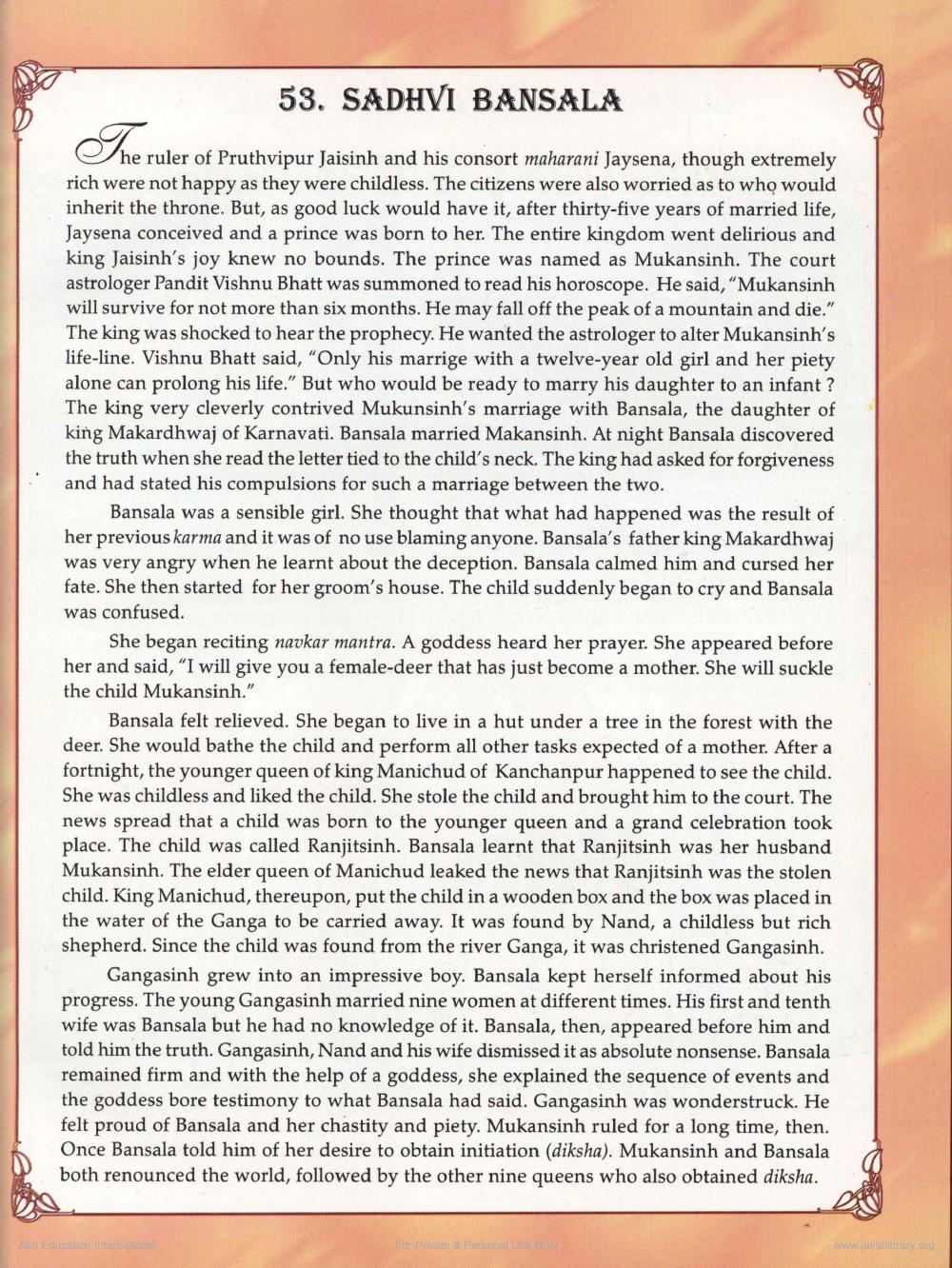________________
53. SADHVI BANSALA
e he ruler of Pruthvipur Jaisinh and his consort maharani Jaysena, though extremely rich were not happy as they were childless. The citizens were also worried as to who would inherit the throne. But, as good luck would have it, after thirty-five years of married life, Jaysena conceived and a prince was born to her. The entire kingdom went delirious and king Jaisinh's joy knew no bounds. The prince was named as Mukansinh. The court astrologer Pandit Vishnu Bhatt was summoned to read his horoscope. He said, "Mukansinh will survive for not more than six months. He may fall off the peak of a mountain and die." The king was shocked to hear the prophecy. He wanted the astrologer to alter Mukansinh's life-line. Vishnu Bhatt said, "Only his marrige with a twelve-year old girl and her piety alone can prolong his life." But who would be ready to marry his daughter to an infant ? The king very cleverly contrived Mukunsinh's marriage with Bansala, the daughter of king Makardhwaj of Karnavati. Bansala married Makansinh. At night Bansala discovered the truth when she read the letter tied to the child's neck. The king had asked for forgiveness and had stated his compulsions for such a marriage between the two.
Bansala was a sensible girl. She thought that what had happened was the result of her previous karma and it was of no use blaming anyone. Bansala's father king Makardhwaj was very angry when he learnt about the deception. Bansala calmed him and cursed her fate. She then started for her groom's house. The child suddenly began to cry and Bansala was confused.
She began reciting navkar mantra. A goddess heard her prayer. She appeared before her and said, “I will give you a female-deer that has just become a mother. She will suckle the child Mukansinh."
Bansala felt relieved. She began to live in a hut under a tree in the forest with the deer. She would bathe the child and perform all other tasks expected of a mother. After a fortnight, the younger queen of king Manichud of Kanchanpur happened to see the child. She was childless and liked the child. She stole the child and brought him to the court. The news spread that a child was born to the younger queen and a grand celebration took place. The child was called Ranjitsinh. Bansala learnt that Ranjitsinh was her husband Mukansinh. The elder queen of Manichud leaked the news that Ranjitsinh was the stolen child. King Manichud, thereupon, put the child in a wooden box and the box was placed in the water of the Ganga to be carried away. It was found by Nand, a childless but rich shepherd. Since the child was found from the river Ganga, it was christened Gangasinh.
Gangasinh grew into an impressive boy. Bansala kept herself informed about his progress. The young Gangasinh married nine women at different times. His first and tenth wife was Bansala but he had no knowledge of it. Bansala, then, appeared before him and told him the truth. Gangasinh, Nand and his wife dismissed it as absolute nonsense. Bansala remained firm and with the help of a goddess, she explained the sequence of events and the goddess bore testimony to what Bansala had said. Gangasinh was wonderstruck. He felt proud of Bansala and her chastity and piety. Mukansinh ruled for a long time, then. Once Bansala told him of her desire to obtain initiation (diksha). Mukansinh and Bansala both renounced the world, followed by the other nine queens who also obtained diksha.
in Education internal
Forte para
o
www.allorary.org




